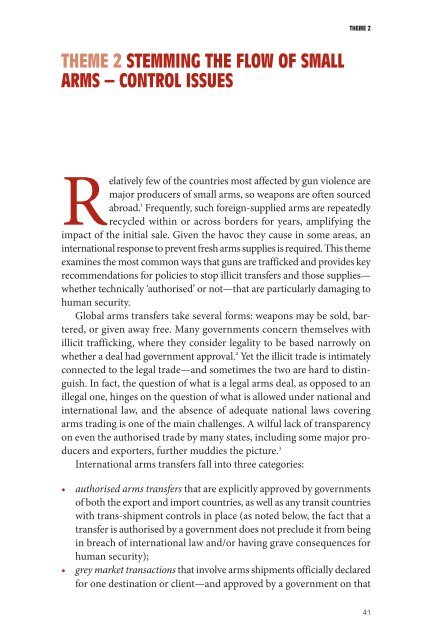MISSING PIECES - Inter-Parliamentary Union
MISSING PIECES - Inter-Parliamentary Union
MISSING PIECES - Inter-Parliamentary Union
You also want an ePaper? Increase the reach of your titles
YUMPU automatically turns print PDFs into web optimized ePapers that Google loves.
THEME 2<br />
THEME 2 STEMMING THE FLOW OF SMALL<br />
ARMS – CONTROL ISSUES<br />
Relatively few of the countries most affected by gun violence are<br />
major producers of small arms, so weapons are often sourced<br />
abroad. 1 Frequently, such foreign-supplied arms are repeatedly<br />
recycled within or across borders for years, amplifying the<br />
impact of the initial sale. Given the havoc they cause in some areas, an<br />
international response to prevent fresh arms supplies is required. This theme<br />
examines the most common ways that guns are trafficked and provides key<br />
recommendations for policies to stop illicit transfers and those supplies—<br />
whether technically ‘authorised’ or not—that are particularly damaging to<br />
human security.<br />
Global arms transfers take several forms: weapons may be sold, bartered,<br />
or given away free. Many governments concern themselves with<br />
illicit trafficking, where they consider legality to be based narrowly on<br />
whether a deal had government approval. 2 Yet the illicit trade is intimately<br />
connected to the legal trade—and sometimes the two are hard to distinguish.<br />
In fact, the question of what is a legal arms deal, as opposed to an<br />
illegal one, hinges on the question of what is allowed under national and<br />
international law, and the absence of adequate national laws covering<br />
arms trading is one of the main challenges. A wilful lack of transparency<br />
on even the authorised trade by many states, including some major producers<br />
and exporters, further muddies the picture. 3<br />
<strong>Inter</strong>national arms transfers fall into three categories:<br />
• authorised arms transfers that are explicitly approved by governments<br />
of both the export and import countries, as well as any transit countries<br />
with trans-shipment controls in place (as noted below, the fact that a<br />
transfer is authorised by a government does not preclude it from being<br />
in breach of international law and/or having grave consequences for<br />
human security);<br />
• grey market transactions that involve arms shipments officially declared<br />
for one destination or client—and approved by a government on that<br />
41
















